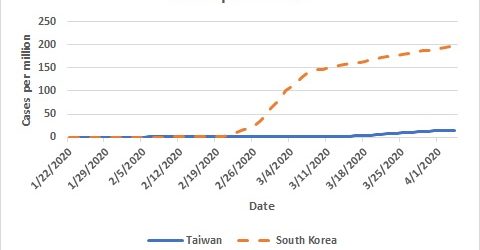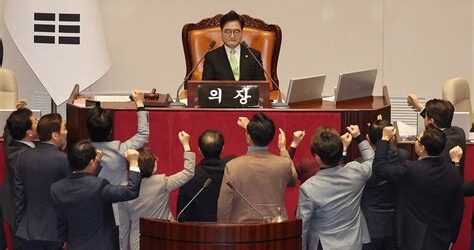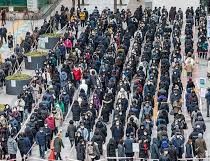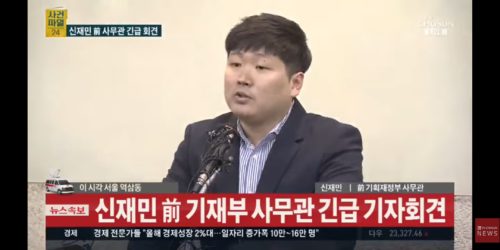Chinagate: Chinese Trolls, Sockpuppets in South Korea to Manipulate Public Opinion Online, Impact Politics, and Intervene in Internal Affairs
2020-3-8, Tara O
China has long been known to employ its “50 Cent Army”– a group used to manipulate public opinion by sockpuppetry and trolling on the internet. Sockpuppetry is creating false online identities by a person or a group to promote their political views; trolling is making deliberately offensive online posts, but also positive ones, in this case, for the Chinese government. According to VOA, the 50 Cent Army is “a platoon in a much larger propaganda apparatus. All those positive posts are planted in an environment that bans most Chinese from legally accessing social media like Twitter, Facebook and YouTube, as well as critical news media” and “online chatrooms, bulletin boards and comment fields under articles.” China also uses the Communist Youth League, “a powerful group with 89 million members aged 14 to 28–a demographic better placed to appeal to youthful internet users.” In South Korea’s case, they also seem to use ethnic Koreans who are Chinese citizens (called Joseonjok) and Chinese students in South Korea, taking advantage of their Korean language skills to place comments online to control opinions. (0:16) Here is how a recent discovery of their existence and activities occurred.
It began with a South Korean citizen placing a petition on the Blue House website calling for the impeachment of President Moon Jae-in for his poor-handling of the Wuhan Virus outbreak. It criticized Moon for not banning entry from China, and said Moon behaves more like the president of China, rather than of the Republic of Korea, because he does not prioritize the citizens of the Republic of Korea. The citizen ended by stating, “It’s difficult to see President Moon Jae-in as our president. I urge his impeachment.” For the complete text in English and Korean, see here.
South Korea has become #2 when it comes to the Wuhan Virus spread after China. Despite the doctors organization (Korean Medical Association) urging the entry ban from China at least six times since late January 2020, Moon refused to do so. He instead talked of “sharing the suffering” and that “China’s difficulties are our difficulties,” which is also posted on the Blue House website. Typically, 10,000 to 30,000 Chinese visit South Korea per day, which makes it difficult to stem the flow of the coronavirus infection. According to the Ministry of Foreign Affairs, the Moon administration sent $5 million to China, as well as 3 million masks, 10,000 protective suits, and other medical supplies in a public-private effort in late January 2020. Large conglomerates also quickly sent supplies and money to China in late January/early February 2020: Samsung gave China 1 million masks, 10,000 protective suits, and about $5 million; LG sent 1.2 million masks, 10,000 protective suits and about $450,000; other businesses, including Hyundai, SK, CJ, POSCO, Doosan, Asiana Airlines, also quickly provided China support. More masks, supplies, and money were sent to China since then, despite the shortages of masks and protective suits for doctors and nurses in South Korea, as well as nation-wide mask shortages for the South Korean public.
South Koreans have been facing massive mask shortages. Many South Koreans waited about five hours in line to buy masks. That was March 4, 2020. The next day, the government restricted mask sales to only 2 masks per person per week and only on designated days. The government also instructed mask manufacturers to increase production 10 times, increase sales to the government from 50% to 80%, and that the government will approve (pay) only 50% of the production cost. Such central planning is exacerbating the situation, by driving out the mask manufacturers, increasing the long lines for mask purchase, and keeping the mask supply low. Each purchaser must produce identification card or passport, so even a 5-year old and the sick must stand in line and buy in person.
With the rapid spread of the Wuhan Virus and Moon’s unwillingness to ban the entry from China, people have become scared and angry at Moon Jae-in for jeopardizing their lives and livelihood, while submitting to China. The citizen’s petition to impeach Moon reflects the frustration and fear from the Moon administration’s poor handling of the Wuhan Virus pandemic, including what many in South Korea call “China-first” policy at the expense of South Korean citizens’ health and lives.
The impeachment petition gathered a total of 1,469,023 signatures; Blue House petitions rarely go over a million, so this is quite an expression of the citizen’s voice. Blue House petitions gather signatures online for 30 days, and this petition began on February 4 to March 5, 2020. It steadily gathered signatures, but started to accelerate starting around February 25 (the 21st day). On February 25, as of 5:00 a.m., there were 300,000 signatures. By 11:30 a.m., the number went up to 450,000. The day before on February 24, the ruling Deobureo Minjoo Party (Democratic Party of Korea) representatives discussed considering “blockading Daegu and North Gyeongsang Province regions,” which led to massive criticism that they are treating the coronavirus-struck area as a subject of Martial Law, rather than a region to be helped. As of 10:22 p.m. on February 26, 830,000 supporters signed the impeachment petition.
As the impeachment support picked up pace, a counter petition titled “We support President Moon Jae-in!” surfaced on the Blue House website the next day on February 26, 2020. Notably, in just two days, this petition received over 800,000 signatories (currently over 1 million), which is highly unusual, leading many South Korean citizens to wonder how it could get so much support so quickly, especially in light of the exponential growth in people infected with the Wuhan Coronavirus and nation-wide mask shortages. (1:15) It took 21 days for the impeachment petition to reach 830,000 supporters while it took only two days for the support Moon petition to reach 800,000.
A netizen noticed that Chinese speakers were giving instructions online to sign the Blue House petition supporting Moon. The photo shows an instruction in Chinese, along with the link to “a petition to oppose the Moon Jae-in Impeachment Petition, as well as a petition to delete the impeachment petition” on the Blue House website. The post shows “Amidst the raging epidemic, President Moon Jae-in faces South Koreans’ opposition and the pressure reached the highest point, but he still is giving China masks, protective suits, and support money. Hope the Chinese in South Korea use their votes to block the impeachment of President Moon…” along with a link to the Blue House petition supporting Moon.
Chinagate
On February 27, 2020, an online post titled “Chinagate” emerged, causing a controversy. A self-described Joseonjok (ethnic Korean who migrated to Northeast China prior to 1945 and their descendants) Chinese claimed that “Joseonjok Chinese and Chinese students in South Korea are using social network services to manipulate public opinion on online communities and portals using online comments and other methods” and that “the Moon Jae-in administration and the ruling party are controlled by China.” The person also posted, “Most of the people who are mobilized for this systematic manipulation of public opinion are [Chinese] university students studying in South Korea, and all of the top-ranked comments on Naver and comments on women’s cafes go through our hands.” [Note: Naver is a popular portal in South Korea.]
Another post appeared later the same day, claiming “Don’t think it’s Koreans that drive online public opinion” and “as soon as ‘the impeachment of Moon Jae-in’ appeared as the Blue House petition, the Chinese Communist Party (CCP), which considers President Moon as part of it, became active and led 500,000 to support the ‘I support President Moon Jae-in’ petition in a period of two days.”
These posts were claims, but what followed caused a stir.
“I am an individual”
On a pro-women social network, a tech savvy netizen posted a comment urging a Blue House petition that supports Moon with a link. The link, however, was not the Blue House petition site, but to an anti-CCP website. Strange comments appeared on the website.
“I am an individual How can I betray? It is not my will.”
“Hey, what are you doing to me?”
“Absolutely absolutely don’t enter (this website). You’ll be hacked. I’m just an individual. Crazy betrayers.”
“I’m just an individual.”
“Did you go on (the website)? What will I do/what will happen to me?”
“Please delete.”
South Koreans thought the comments were strange, especially the “I’m an individual” comments. It turns out that the link was to “Dongtai Wang,” a website that automatically opens, after the launching of a software Freegate (or Tsuymen in Chinese), the Blockade Breakout Program developed in 2002 by the Global Internet Freedom Consortium, an NGO in the U.S. comprised of those whose human rights have been violated by the Chinese government. It allows the users to break through the CCP’s Great Firewall, an internet surveillance and censorship system, to access overseas sites. The website has articles critical of the CCP.
Visiting the forbidden websites leave records. The Chinese authorities then will investigate them. Afraid of repercussions, they left those comments, such as “I’m an individual,” to try to leave a record explaining to the CCP authorities that they did not visit the website as part of an organized effort. If the Chinese authorities assessed that the Chinese trolls went to the forbidden websites as an organized activity, then they will be investigated while incarcerated, and it is unsure if they can even return home to China. Thus they emphasize it is an “individual” act, rather than an “organized” act.
Another technically proficient netizen tried a similar approach, and got the same “I’m an individual” and other strange comments. The netizen added phishing links (that do not reveal directly the website’s titles)–websites about opposing the Uighur oppression, supporting the Hong Kong democracy movement, the Epoch Times, and the Tibet provisional government to online communities with millions of members, such as women online communities, regional “mom cafes,” automobile-related large communities, fashion communities, etc. Again, numerous “I’m an individual” comments surfaced. Some community owners deleted the links, while others expelled the account that posted the links.
@comewithmesir (김겨쿨, Kim Gyeo Cool)
A twitter account @comewithmesir (김겨쿨, Kim Gyeo Cool) with 4,600 followers instructed its followers to click “thumbs down” next to the phishing link posting to make it disappear from the top view, but the netizens then retwitted the links, after which @comewithmesir made the twitter account non-public, then finally deleted the account.
This is not the first time @comewithmesir gave its followers instructions. On February 26, 2020, around 10:46 a.m., an article titled “More than 1,000 Coronavirus Patients in South Korea” appeared. Top comments (with the most “thumbs up”) before 11 a.m. were critical of the Moon administration, such as “By choosing the wrong president, the country is ruined” and “What is the government head thinking by not banning Chinese entry, but blocking Daegu.” After 1 p.m., however, such comments as “More transparent than any other country and precisely moving government of the Republic of Korea is really reassuring” suddenly rose to the top with the most “thumbs up.” This sudden change, especially when the Wuhan Coronavirus infection is spreading exponentially, led to the suspicion that Moon Jae-in’s die hard fans (called “Moonppa” or “Daekkaemoon”) are manipulating public opinion.
In the afternoon of February 27, 2020, @comewithmesir instructed its followers to recommend (click “thumbs up”) “Shinchonji intends to ruin the country,” to deflect the blame for the Wuhan Virus spread away from Moon’s policies, especially his refusal to ban entry from China. The followers then rushed to various social media and posted comments linking the Shincheonji religious sect, where many were infected, to the opposition party. In September 2019 during the midst of the Cho Kuk scandal (see here for details), the account @comewithmesir also conducted similar opinion manipulation schemes using a macro program to click “thumbs down” repeatedly on comments, such as “Impeach Moon Jae-in,” “Special Prosecutor for Cho Kuk (조국),” “Jail Jeong Kyung-sim (정경심) [Cho Kuk’s wife]” and “Justice is canceling Cho Min’s (조민) [Cho Kuk’s daughter] [university] admission,” removing them far away from the top section, which in effect removed them from the smartphone screen view (which shows only the top five comments).
National Assembly Petitions
Additionally, another petition calling for the impeachment of Moon Jae-in went on the National Assembly website, along with a petition that supports Moon. The key difference between the Blue House Petition website and the National Assembly Petition website is that the latter requires an identification authentication, so one person can only get one account (unless an account is hacked) and the person must be a South Korean citizen, where as the Blue House website does not require authentication, so one person can have multiple accounts (various Google accounts, etc.) and citizens of any country can participate, although that is not the intent. (2:14)
As mentioned earlier the petition supporting Moon (anti-impeachment) garnered 800,000 supporters in just two days on the Blue House website, but only 50,000 in 2 ½ days on the National Assembly website, which is far less. (2:45) By contrast, the petition to impeach Moon received 100,000 supporters in about 3 days, which is more in line with the speed at which the petition on the Blue House website was signed. (3:08) What explains this difference?
When the support reaches 100,000, the petition on the National Assembly ends automatically, as it reached the number needed to be considered to determine whether it should be introduced to the Plenary Session of the National Assembly. (4:01) National Assemblywoman Lee Un-ju (이언주), of the Unified Future Party, said she will introduce a modification bill that prevents opinion manipulation by preventing non-South Korean citizens as well as one person having multiple accounts participating in Blue House petitions. (4:15) Lee pointed out that China-originated support for Moon through the Blue House petition drastically increased. (4:33) She also said if the Blue House petition is manipulated by Chinese, then these foreigners will weaken the Republic of Korea’s authority and the country’s fate and plunder sovereignty. (4:39)
Petitioner sued for libel
The Blue House impeachment petition ended on March 4, 2020. On that day, the person who placed the impeachment petition on the Blue House website was charged with libel. An organization called “Citizens’ Participatory Solidarity to Liquidate Deep Rooted Evil” (적폐청산국민참여연대), filed three criminal charges against the impeachment petitioner with the police, stating that the petitioner’s claim that the government supplying China with 3,000,000 masks is false, that the petition defamed Moon Jae-in, and that his petitioning hindered the government from carrying out its duties.
It is unclear if the “Citizens’ Participatory Solidarity to Liquidate Deep Rooted Evil” also has a Chinese connection, but its effort to suppress freedom of speech and the freedom to petition the government is in line with the CCP’s stance as well as the Moon administration’s record of suing citizens for libel, except in this case, the suing is performed by a third party.
Chinese students
About 70,000 Chinese students are enrolled in South Korea. (12:06) Up to 75% of them are believed to be members of the Communist Youth League, which is linked to the Chinese Communist Party (CCP). In November 2019, South Korean students posted posters on the campuses of Hanyang University, Yonsei University, and Konkuk University supporting Hong Kong citizen’s calls for freedom and their rejection of the extradition bill. Chinese students showed up and tore down the posters. At Hanyang University, there was a 7-hour confrontation. Kim Ji-mun, a student who put a pro-Hong Kong banner on campus, told Reuters, ‘They come in groups, cursing and saying they would kill us. They took photos of the students who support Hong Kong and shared them on social media.’
China is also suspected of inserting its students in South Korea into the candlelight protests that led to the impeachment of the democratically elected president Park Geun-hye and in anti-THAAD protests.
Beijing is known to use its students overseas for political purposes. Kirsten Tatlow writes in the Atlantic about Chinese student organizations in Europe that China meticulously puts together “associations [to] support the Chinese Communist Party’s ideology and goals—and its narrative about China—among both Chinese and Europeans, and try to ensure that its overseas citizens, and others of ethnic Chinese descent, are loyal.” Chinese student association overseas “receive guidance from the CCP through Chinese embassies and consulates…and are active in carrying out overseas Chinese work consistent with Beijing’s United Front strategy,” according to the U.S.-China Economic and Security Review Commission. Even the ones who are unwilling could be pressured. Some students are even forced to “act as pawns in the ever-expanding espionage war that Beijing is running against Washington and its allies.”
China’s keyboard warriors to interfere in South Korea’s elections?
The sockpuppetry and trolling, as well as the behaviors of some Chinese in South Korea, raise concerns whether China will interfere in the upcoming general elections on April 15, 2020 in South Korea, as China has already tried to interfere in Taiwan and elsewhere. In Taiwan, China tried to tip the election towards the China-friendly candidate in the January election using “keyboard warriors.” The Financial Times further stated that “This siege of propaganda comes via social media as well as traditional news channels: journalists working at one Taiwan media group have told the FT that their editors have received instructions on coverage directly from Beijing. As well as propaganda, there’s also disinformation—outright falsehoods or conspiracy theories—propagated via Chinese and foreign social media.”
China has also tried to take over Australia’s political system, using espionage and foreign interference. Duncan Lewis, the retired Australian Security and Intelligence Organization chief, accused China of trying to control Australia’s political system, and said, “You wake up one day and find decisions made in our country that are not in the interests of our country.” In South Korea, numerous South Korean citizens are noticing the same.






